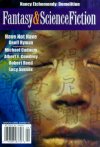
 |
|
Short Fiction
Highlights from the April Fantasy and Science Fiction
The lighthearted entry in this trio is "Nature 2000", by Albert E. Cowdrey. Cowdrey has appeared regularly in F&SF over the past few years, with some atmospheric and generally somewhat humorous horror-tinged tales set in New Orleans, as well as last year's two impressive long science fiction novellas set in a despotic far future, "Crux" and "Mosh". "Nature 2000" is a brief "biter bit" piece, about a spooky man who, we soon learn, makes a habit of eating his visitors. He receives a visit from a young woman, a census worker, and plans to make her his next victim, but she has her own ideas. It's not a deep or terribly original story, but it makes good use of its brief space. Carrie Richerson's "The Golden Chain" is much more serious, and more affecting. A woman has lost her lover, and worries about how their son will do without his mother. So she decides to use a magical procedure to kidnap a beautiful young girl and send her to the land of the dead to bring back her lover. Richerson tells this story in alternate scenes, from the point of view of the kidnapper and the young girl. She also eschews moralizing -- so that the monstrous deed of one of the main characters is viewed entirely neutrally -- a choice which I admit I found disconcerting, but which does, I think, add to the power of this dark story. The third horror story here is Nancy Etchemendy's "Demolition". This starts unpromisingly, as we are introduced to architect David Corwin on the site of his latest project, the demolition of an old apartment building to make room for a new highrise. When an old Chinese woman (an evicted resident) dies of a heart attack, after perhaps having been brushed aside by Corwin, and her husband curses Corwin, we seem set up for a shrill diatribe about evil developers and virtuous poor people. But while that notion remains in the background of the story, Etchemendy manages to find a human core in Corwin: his predicament, and its roots in his character, start to matter to us. And the way the curse works out in Corwin's life, signaled by the title and by his love for his remote and elegant house, is cleverly worked out and interesting to see in action. This isn't a wholly successful story -- I was left with a feeling that the situation was a convenient auctorial setup, allowing the reader to make too easy choices -- but it's still nicely done, and legitimately scary. I've talked about several stories in this issue that qualify as "horror", but it would be remiss of me not to mention the best story here, even if it is not by any means "horror" but rather a fine example of near future science fiction, focusing on plausible technology and its effect on real people. I am talking about Geoff Ryman's "Have Not Have". It's set in a remote Chinese village, perhaps a couple of decades in the future. This village is almost unconnected with "civilization", per se, and that lack of connection is a business opportunity for Mae, the town's "fashion expert". Ryman shows us how Mae uses her knowledge, her connections, and the villagers' lack of knowledge to forge a living for herself, and to maintain a certain position. She is the woman everyone goes to to find dresses for weddings and graduations, to find fancy makeup, to get advice on hairstyles and the like. Ryman subtly shows us, in a few scenes of Mae visiting various elements of village society, something of the whole structure of the village, the economic, social, gender, and religious divisions. Mae is presented almost cynically, but we come to feel great sympathy for her. Then the idea of a universal net connection (via direct brain interface) is broached -- obviously this will completely change things for Mae in particular, and the rest of the village too. No answers are offered -- just the picture of one woman, a good if compromised woman, at the hub of a change she may not survive. This is a very fine, very quiet, effective story. The April issue of F&SF is a first-rate issue top to bottom, with other fine stories that I haven't mentioned, particularly a story about Werner Heisenberg and his controversial and ambiguous involvement with the Nazis ("Absolute Uncertainty" by Lucy Sussex), and a nice gender-reversal fairy tale retelling ("Rude Kate" by July Lewis). I continue to be impressed and pleased with the work Gordon Van Gelder is doing.
Rich Horton has reviewed short SF and novels for Tangent, SF Site, Black Gate, Antipodes, and Maelstrom SF. By day he is a software engineer for a major aerospace firm. |
||||||
| TOP |
| © 2001 by Locus Publications. All rights reserved. |
 I found the April issue of The Magazine of Fantasy and Science
Fiction to be one of the better recent issues of this magazine --
hopefully a good omen for Gordon Van Gelder's publishing efforts.
(And my issue even had the full complement of periods!) Three of the
most striking stories were horror stories -- but horror stories which
turned on nice fantastical ideas, not stories driven by the desire to
scare or shock.
I found the April issue of The Magazine of Fantasy and Science
Fiction to be one of the better recent issues of this magazine --
hopefully a good omen for Gordon Van Gelder's publishing efforts.
(And my issue even had the full complement of periods!) Three of the
most striking stories were horror stories -- but horror stories which
turned on nice fantastical ideas, not stories driven by the desire to
scare or shock.